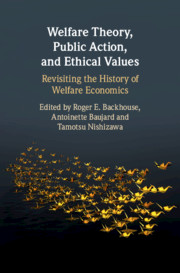Book contents
- Welfare Theory, Public Action, and Ethical Values
- Welfare Theory, Public Action, and Ethical Values
- Copyright page
- Contents
- Figures and Tables
- Contributors
- Acknowledgements
- Introduction: Revisiting the History of Welfare Economics
- Part I Plurality of Welfare in the Making of Welfare Economics
- Part II Developing Modern Welfare Economics
- 7 John Hicks’s Farewell to Economic Welfarism
- 8 Individualism and Ethics
- 9 Non-welfarism in the Early Debates over the Coase Theorem
- 10 Musgrave and the Idea of Community
- 11 Non-welfaristic Features of Kenneth Arrow’s Idea of Justice
- 12 Beyond Welfarism
- 13 The Influence of Sen’s Applied Economics on His Non-welfarist Approach to Justice
- 14 Conclusion
- Index
- References
8 - Individualism and Ethics
Samuelson’s Welfare Economics
from Part II - Developing Modern Welfare Economics
Published online by Cambridge University Press: 04 March 2021
- Welfare Theory, Public Action, and Ethical Values
- Welfare Theory, Public Action, and Ethical Values
- Copyright page
- Contents
- Figures and Tables
- Contributors
- Acknowledgements
- Introduction: Revisiting the History of Welfare Economics
- Part I Plurality of Welfare in the Making of Welfare Economics
- Part II Developing Modern Welfare Economics
- 7 John Hicks’s Farewell to Economic Welfarism
- 8 Individualism and Ethics
- 9 Non-welfarism in the Early Debates over the Coase Theorem
- 10 Musgrave and the Idea of Community
- 11 Non-welfaristic Features of Kenneth Arrow’s Idea of Justice
- 12 Beyond Welfarism
- 13 The Influence of Sen’s Applied Economics on His Non-welfarist Approach to Justice
- 14 Conclusion
- Index
- References
Summary
This chapter argues that, although Samuelson developed much of the standard welfare theory based on individualism and the Pareto criterion, he attached great importance to ethical judgments that went beyond welfarism. Following his teacher, Frank Knight, he consistently argued that welfare judgments had to be based on ethical assumptions, his social welfare function providing a way that the implications of alternative ethical judgements could be analyzed. He attached great importance to the distribution of income and his own ethical values involved non-consequentialist elements.
- Type
- Chapter
- Information
- Welfare Theory, Public Action, and Ethical ValuesRevisiting the History of Welfare Economics, pp. 186 - 207Publisher: Cambridge University PressPrint publication year: 2021
References
- 3
- Cited by

